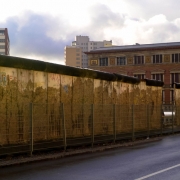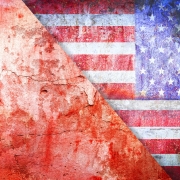Eastern Europe Sees Liberal Orthodoxy As Just As Tyrannical As Communist Orthodoxy, Charts Its Own Path.
BERLIN—Thirty years after the Berlin Wall fell, ending the Cold War in Europe, new political divisions are rising between East and West.
Despite the economic success of German reunification and the triumph of democracy across Eastern Europe, the two regions are drifting apart again in a clash of values that is threatening the cohesion of the Western alliance and the European Union.
In most of the West, mainstream parties, while increasingly challenged by insurgent politicians, are largely sticking to a postwar consensus forged around liberal values, the rule of law, fundamental human rights and time-tested institutions.
Much of the East is a mirror image, where nativist parties that favor more authoritarian rule and reject immigration, ethnic and religious diversity, gay rights and feminism as signs of weakness and moral decadence are either in power or on the ascent.
Some Eastern European countries that once fought against Soviet oppression, such as Poland, the Czech Republic and Hungary, are now ruled by governments that vehemently reject some liberal Western values.
Even some former East German democracy activists are now marching against the establishment with far-left or far-right movements, including the anti-immigration Alternative for Germany party or AfD, now among the country’s largest.
Vera Lengsfeld, a German author, academic and former legislator, received the Federal Cross of Merit, Germany’s highest peacetime honor, for battling the totalitarian regime of the former communist east. She was imprisoned after her husband, a poet, informed on her to the secret police.
But three decades after she watched the Berlin Wall crumble, Ms. Lengsfeld is unsheathing her quill for a new fight: against the liberal government of Chancellor Angela Merkel that she once supported.
Ms. Lengsfeld says she rejects the AfD, but she shares their criticism of Ms. Merkel’s generous asylum policy, and has campaigned against mass immigration. She says political correctness is threatening free speech, leading to her views being dismissed as extremist.
“I think the West has forgotten what democracy means,” she said. “The gap between the governments and the governed is widening, and the former despise the latter.”
In a series of interviews last week in German media, Ms. Merkel said such claims made in a free democracy like Germany were strange, and warned that freedom of expression doesn’t constitute the right to have one’s opinion unchallenged.
To be sure, the divides in Europe aren’t clear-cut. Some parties in Italy, France and Austria have rejected immigration and Islam, while eastern countries like Slovakia have chosen liberal governments. Recent elections ushered in a crop of liberal mayors to countries run by nativist parties, including Hungary and Poland.
Citizens of the former East Germany say they are less satisfied than those in the West, and are more likely to support the anti-immigration Alternative for Germany party.
In his recent book, “The Light That Failed,” Ivan Krastev, a Vienna-based Bulgarian academic, explores how the two parts of Europe embraced each other, only to diverge again. Mr. Krastev cites studies about how despite the East’s economic surge, majorities who say they are satisfied with their lives still vote for antiestablishment nativists such as Hungarian Prime Minister Viktor Orban.
Mr. Krastev said Mr. Orban and other self-proclaimed illiberal leaders pander to voters who rebel against what the academic calls the “replacement of communist orthodoxy with a liberal orthodoxy.”
In Mr. Krastev’s view, the dictate of communist apparatchiks in the East was replaced by the patronage of the EU and other international organizations who presided over painful economic overhauls.
Millions of people have left Eastern Europe for the West since 1989, robbing entire regions of their educated elites. In the former East Germany, which has lost nearly four million people since reunification, the AfD is particularly strong in places where more people have left.
The view of emigration as a threat to fragile communities also in part explains widespread opposition to immigration in the region, say some experts, Mr. Krastev says.
Eastern Europe, once among the world’s most diverse regions, was carved up by the Ottoman, Habsburg, Russian and German empires until those multinational states perished in the wars of the 20th century. The forced exchange of populations that followed yielded homogenous societies.
Branko Milanovic, a New York-based economist from Serbia, said the revolutions of 1989 were struggles of national emancipation more than a broad democratic uprising. Even as 1989 offered democracy followed by EU membership and rapid economic growth, Eastern nations never embraced ethnic diversity, Mr. Milanovic said.
Ironically for a region where citizens were banned from freely traveling during the Cold War, a study by Mr. Krastev for the European Council on Foreign Relations found that 50% of Poles and 49% of Hungarians favored making it illegal for their own citizens to leave for long periods as a policy response to migration.
Jaroslaw Kaczynski, the leader of Poland’s ruling party, has asked the U.S. to abandon the process of lifting visa requirements for Polish citizens for fear it could further fan emigration, according to two officials. Aides eventually persuaded him to give up his resistance to the visa waiver, which was then seen a diplomatic coup of his administration.
The Polish and Hungarian governments have both been accused in the West of curtailing freedom of the press and capturing the courts and other institutions of state. Both have been remarkably successful at the polls.
In the Czech Republic, Prime Minister Andrej Babis has stoked similar controversies. Pavel Telicka, a former ally of Mr. Babis who left the prime minister to form his own, liberal party, said he became disillusioned by the populism of his old ally. But he admits that politicians like Mr. Babis have successfully tapped into economic angst and frustration.
Despite strong growth, the former communist regions—including east Germany—haven’t caught up with Western income levels. And the cradle-to-grave state support of the Soviet era is gone.
“The inability of traditional political parties to provide solutions to people’s problems has maybe helped the rise of populism,” said Czech Foreign Minister Tomas Petricek. He cited the EU’s failure to resolve the eurozone and refugee crises as a cause for disillusionment in his country.
Witold Waszczykowski, Poland’s former foreign minister, said the definition of liberalism changed within the West itself, expanding to include values such as ethnic diversity and LGBT rights after politicians embraced what he calls left-liberal democracy.
Helmut Kohl, the late German chancellor and architect of German and European reunification, foresaw the current backlash, according to Daniel Biskup, a photojournalist who documented the fall of the Wall and its aftermath in three books.
Mr. Biskup took a now iconic photograph of Mr. Kohl as he promised 100,000 people in the eastern state of Thuringia in 1990 to turn the impoverished land into “blooming landscapes.”
“He knew there could be trouble. He told me the blooming landscapes would only come if everyone—especially the West and its industry—pulled together,” Mr. Biskup said. “But that didn’t happen. We left market forces do their work.”
In October this year, the AfD won nearly 24% of the vote in Thuringia and became the second-biggest party, behind the radical left.
Back in East Berlin, Ms. Lengsfeld, the former dissident, said the social change that she herself helped bring about has now made her think about emigrating.
“If I were younger, I would emigrate myself. Maybe not to Prague, it’s overrun by tourists, but perhaps somewhere further East,” she said.
By Bojan Pancevski at wsj.com
Copyright ©2019 Dow Jones & Company, Inc. All Rights Reserved.





